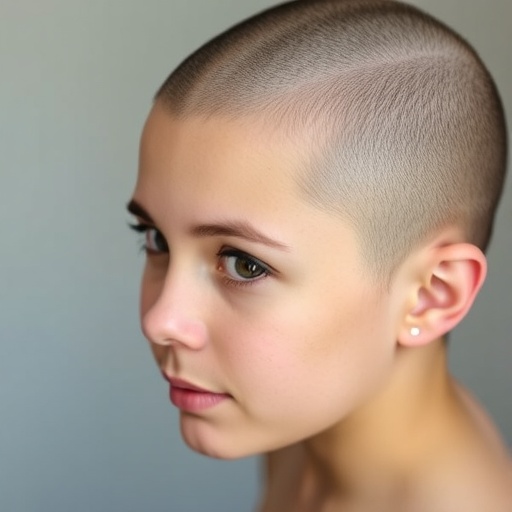
Alopecia areata is an autoimmune disorder characterized by hair loss, which can manifest in varying degrees of severity. As the body’s immune system mistakenly attacks hair follicles, it leads to the distinct hair loss associated with the condition. Recent research has highlighted the psychosocial impacts of this disorder, revealing a complex interplay between physical health, mental health, and quality of life. More specifically, the study conducted by Hanson et al. sheds light on the burdens faced by patients with differing severity profiles of alopecia areata.
In their groundbreaking research, the authors sought to understand how the severity of alopecia areata correlates with patient-reported psychosocial burdens. Patients often experience a range of psychological effects, including anxiety, depression, and reduced self-esteem. These effects can be greatly intensified based on the severity of their condition. By surveying patients across different stages of alopecia areata, the study provides valuable insights into how the condition affects individuals on a personal level.
Furthermore, the study examines the implications of these psychosocial burdens on the overall quality of life for patients. Quality of life is a crucial aspect for those living with chronic illness, and it encompasses various dimensions such as physical health, emotional well-being, and social functioning. The findings from Hanson et al. illustrate that as the severity of alopecia areata increases, patients report a more significant decline in their quality of life. This interconnectedness highlights the need for tailored interventions that address both the physical and emotional facets of the condition.
One of the standout elements of this research is its focus on work productivity impacts. The authors found that individuals with more severe alopecia areata not only experienced personal distress but also faced challenges in their professional lives. This created a cyclical effect where the stress of hair loss led to diminished workplace performance, which in turn exacerbated feelings of inadequacy and stress. Understanding this dynamic is critical for employers and healthcare providers, as it emphasizes the importance of offering supportive resources for affected individuals.
This research utilizes a robust methodology, combining quantitative assessments with qualitative feedback from participants. By allowing patients to voice their experiences, the study captures a nuanced understanding of the emotional and social challenges encountered. The integration of reliable data points alongside personal stories paints a comprehensive picture of what living with alopecia areata truly involves.
Moreover, the study highlights the variability in how different patients cope with their experiences. While some may develop resilience and seek support networks, others may struggle with feelings of isolation and hopelessness. This dichotomy underscores the necessity for personalized treatment strategies that acknowledge individual experiences and coping mechanisms.
In addition to the direct impacts on psychological well-being and work productivity, the findings may also underscore the importance of public awareness campaigns. By educating the general population about alopecia areata, societal stigma can be reduced, potentially leading to improved social acceptance for those affected by the condition. When awareness increases, individuals may feel less alone and more inclined to seek help, which could ultimately enhance their quality of life.
The significance of this research extends beyond the individual level; it also has vital implications for healthcare policy. As understanding deepens regarding the psychosocial burdens of alopecia areata, healthcare providers can advocate for more comprehensive management plans that integrate mental health services. This integrated approach could lead to better health outcomes and improved quality of care for patients grappling with this condition.
Moving forward, researchers in this field are encouraged to delve deeper into the various factors that influence psychosocial outcomes among alopecia areata patients. Longitudinal studies could shed light on how these burdens evolve over time and the effectiveness of various intervention strategies. Additionally, exploring the genetic and environmental triggers of alopecia areata could lead to novel treatment options that address the autoimmune origins of the disorder.
Ultimately, the findings presented by Hanson et al. serve as a call to action for both the medical community and society at large. There is a pressing need for initiatives focused on supporting individuals living with alopecia areata, addressing the holistic challenges they face. By fostering an environment of understanding, empathy, and effective support, the impacts of this condition can be mitigated, allowing individuals to live fuller, more productive lives.
In conclusion, the insights gained from this study open the door to a better understanding of alopecia areata and its pervasive effects. As we elevate the discourse around this condition, it is imperative that healthcare providers, researchers, and society collectively work towards a future where those affected by alopecia areata receive the support and care they deserve. The path to improved quality of life and psychosocial well-being for these patients begins with acknowledging their experiences and advocating for comprehensive treatment options.
Subject of Research: The psychosocial burdens and quality of life impacts among patients with alopecia areata.
Article Title: Patient-Reported Psychosocial Burdens and Quality of Life and Work Productivity Impacts Among Patients with Clinically Distinct Alopecia Areata Severity Profiles.
Article References:
Hanson, K.A., Austin, J., Clayton, N. et al. Patient-Reported Psychosocial Burdens and Quality of Life and Work Productivity Impacts Among Patients with Clinically Distinct Alopecia Areata Severity Profiles.
Adv Ther (2025). https://doi.org/10.1007/s12325-025-03302-8
Image Credits: AI Generated
DOI: 10.1007/s12325-025-03302-8
Keywords: Alopecia areata, psychosocial burdens, quality of life, mental health, work productivity.
Tags: Alopecia areata impact on quality of lifeanxiety and depression in alopecia patientsautoimmune disorders and mental healthchronic illness and quality of lifeemotional well-being in alopecia areatapatient-reported outcomes in alopeciapsychological burdens of alopeciapsychosocial effects of hair lossresearch on hair loss effects.self-esteem and hair lossseverity of alopecia areatasocial functioning with hair loss





